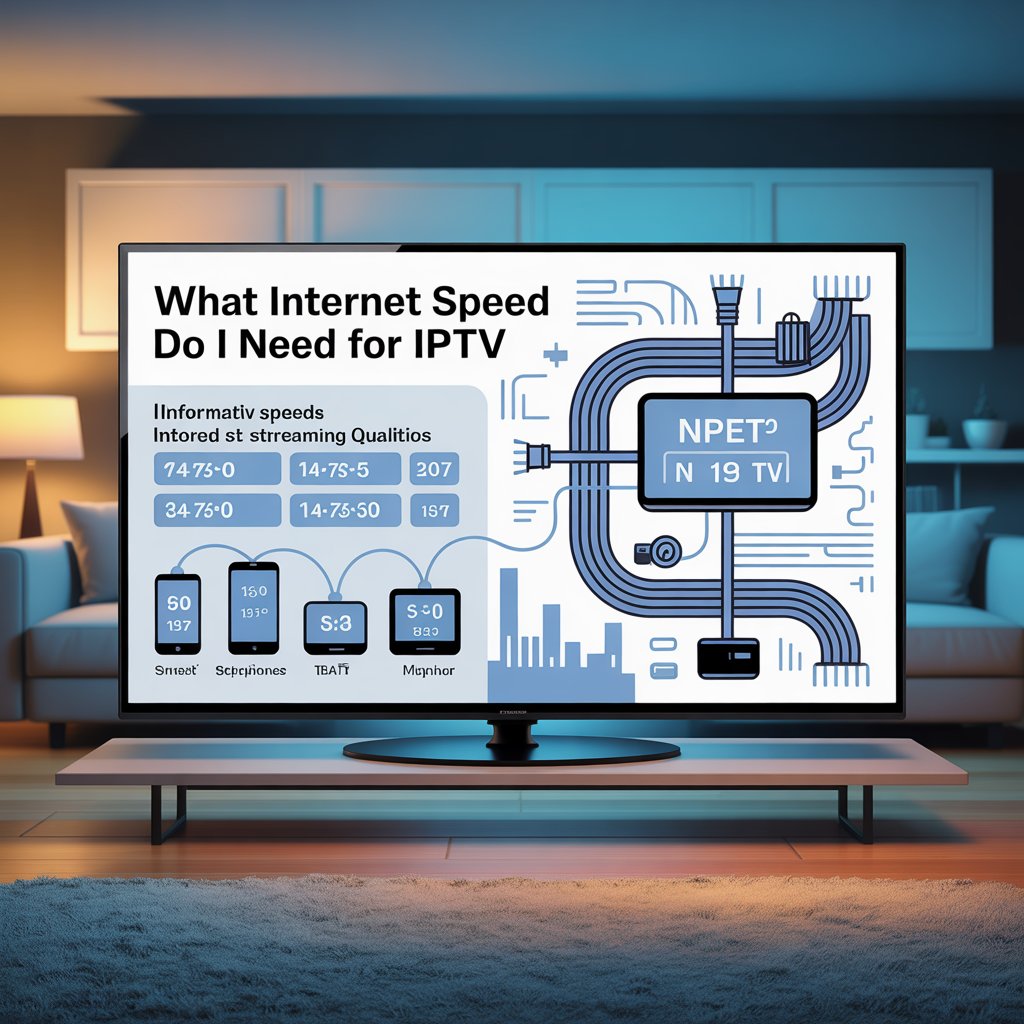what internet speed do i need for iptv

- Speed Depends on Quality
When you’re trying to get your IPTV set up, it’s easy to get stuck on the most basic question: what internet speed do i need for iptv? The simple answer is that there’s no single magic number, because it all hinges on the quality of the picture you want to see. Think of it like water flowing through a pipe – a small, blurry, standard-definition (SD) video stream is like a trickle of water that can get through a narrow pipe, while a crystal-clear 4K stream is like a rushing river that needs a much, much wider pipe to flow smoothly without backing up.
Let’s break that down into real-world terms. For an older, smaller TV, a standard-definition stream might look perfectly fine, and for that, you only need a slow and steady speed of around 5 Mbps. But if you’re watching on a modern HD television, you expect a sharp, clear picture. That HD picture contains significantly more visual data that has to be delivered to your screen every second. Suddenly, that initial question of “what internet speed do i need for iptv?” becomes more specific, and for a smooth HD experience without frustrating glitches, you really need to be in the 10 to 15 Mbps range.
This is where things get serious for people who want the absolute best picture. If you’ve invested in a 4K TV, you’re dealing with a massive leap in data. A 4K picture is four times more detailed than HD, meaning it’s incredibly data-hungry and will instantly overwhelm a slower connection. If you’re aiming for that cinematic, ultra-sharp quality, the question of “what internet speed do i need for iptv?” demands a much bigger answer—you should be looking for a minimum of 25 Mbps, and even more if other people are using the internet in your home.
Ultimately, not having enough speed for your chosen quality is the number one cause of that dreaded buffering wheel that spins forever. Your device is essentially waiting for enough video data to arrive before it can continue playing. This is why understanding the link between quality and bandwidth is so important. It all comes back to that one crucial question you have to answer before you can enjoy a seamless stream: based on the quality I expect, what internet speed do i need for iptv?
- Stability is More Important Than Speed
It’s easy to get caught up in the big speed numbers that internet providers promote, but for IPTV, that’s only part of the picture. When you ask, “what internet speed do I need for IPTV?”, the best answer isn’t just a number, but a quality. Picture it like drinking from a water hose: a powerful hose that keeps sputtering is much more frustrating than one with lower pressure but a steady, uninterrupted flow. An unstable connection, no matter how fast, will always ruin your viewing experience.
So, what does “instability” really mean? It refers to small, constant interruptions or “hiccups” in your internet connection, commonly called packet loss or jitter. You might not notice these gaps when browsing a website, but IPTV is very sensitive to them. Each hiccup is a moment when video data is lost, forcing your player to pause and catch up. So, when trying to find the answer to “what internet speed do I need for IPTV?”, remember that even a 100 Mbps plan is useless for streaming if it doesn’t provide that data in a smooth, consistent flow.
This instability causes the dreaded buffering wheel. Your IPTV player tries to stay ahead by keeping a small buffer of video stored, but a shaky connection drains that reserve faster than it can refill. This is why a slower, stable 15 Mbps connection often outperforms an unstable 50 Mbps connection. It adds an important layer to the question “what internet speed do I need for IPTV?”, because the best answer must always be “a stable one, above all.”
Ultimately, the simplest way to ensure stability is to use a wired Ethernet cable instead of Wi-Fi whenever you can. A direct line to your router reduces most of the interference that leads to these connection hiccups. So before you choose the highest number to answer “what internet speed do I need for IPTV?”, focus on the quality of your connection. A steady, reliable stream is always better than a powerful but inconsistent one when it comes to watching television.
- Consider Total Household Use
When you’re trying to fix your streaming issues, it’s easy to think only about the TV and ask, “What internet speed do I need for IPTV?” However, we often forget that our home’s internet connection is not just for one device. Picture your internet plan as one large pizza for the entire family. If you’re watching the big game while three other people are using their phones, laptops, and game consoles, your slice will be much smaller than you expected.
Let’s break it down with some numbers. Imagine your HD stream requires a stable 15 Mbps. At the same time, someone else in the house starts a 4K stream on another service, which needs 25 Mbps. Additionally, another person is on a video call for work, using 5 Mbps. Suddenly, your household needs a total of 45 Mbps for everyone, not just for you.
This is where annoying buffering and pixelated images often come into play, even with a “fast” plan. When all the devices compete for bandwidth at the same moment, your IPTV stream usually loses out. Activities like online gaming and large downloads can take up a lot of bandwidth, leaving your TV stream with minimal resources. That’s why you might find yourself asking, “What internet speed do I need for IPTV?” when the real issue is the total traffic in your home.
The best solution is to get enough bandwidth for everyone, especially during peak times. Before you pick an internet plan, consider when everyone in your home goes online, like an evening in Fes. Add up the potential needs of all devices, then include a little extra for good measure. You’ll soon realize that the key question isn’t just “What internet speed do I need for IPTV?” but rather, what internet speed does my entire household need to be satisfied?
- A Wired Connection is Best
Most people focus solely on the numbers when they ask, “What internet speed do I need for IPTV?” However, they often ignore something just as important: how the internet signal travels from your router to your TV. Think of your Wi-Fi as a crowded, noisy party. Getting a clear signal to your TV is like trying to have a good conversation with someone across the room. The signal gets blocked by people (walls), drowned out by music (other electronics), and generally disrupted.
This “noisy party” of Wi-Fi interference creates big challenges for streaming. In Fes, for example, thick walls can be a major signal problem. But it’s not just walls; microwaves, cordless phones, and even your neighbors’ Wi-Fi networks can interrupt the connection between your router and your TV. This interference causes small data losses that lead to buffering. That’s why the answer to “What internet speed do I need for IPTV?” becomes irrelevant if the signal is damaged along the way.
Now, picture leaving that noisy party and stepping into a quiet side room for a direct, one-on-one conversation. That’s an Ethernet cable. It creates a private, shielded tunnel from your router to your IPTV device, making it unaffected by all that interference. A wired connection provides the full, stable speed you are paying for without interruptions. It simplifies the entire question, giving you a solid answer when you wonder, “What internet speed do I need for IPTV?”
Before you spend more money on a faster plan or blame your provider for buffering, try the easiest and most effective solution: run an Ethernet cable to your device. It may be less convenient than Wi-Fi, but it’s the best way to ensure a stable, high-quality picture. You might find that the real answer to “What internet speed do I need for IPTV?” isn’t about getting more speed, but about making sure the speed you already have arrives perfectly.
- Check Your Provider’s Recommendation
When troubleshooting IPTV, many people get stuck on one question: what internet speed do I need for IPTV? They often believe that a higher number is always the solution, but they usually overlook how that speed actually reaches their screen. Think of your Wi-Fi as a long, flexible garden hose stretched across your yard. It’s convenient, but it can be stepped on, get kinked, or develop tiny leaks. This means the water pressure you receive at the end is never guaranteed.
Those “kinks” and “leaks” in the Wi-Fi signal cause frustrating buffering and pixelated images. Every wall the signal goes through, every microwave that turns on, and every nearby Wi-Fi network creates interference that weakens your connection. This is why it’s so tough to depend on Wi-Fi for a smooth stream. The speed is always changing. This makes it hard to answer “what internet speed do I need for IPTV?” because the speed you have is not the same as what your TV is actually receiving.
In contrast, a wired Ethernet connection is like a solid PVC pipe running directly from your water main to your tap. It’s a private path that avoids all outside interference. It guarantees that the full speed and stability of your internet plan reach your IPTV device without any loss. Using a cable gives you a stable foundation, which makes it easier to answer “what internet speed do I need for IPTV?” because you know you’re getting the most out of the connection you already pay for.
So, before you think about upgrading your internet plan or blaming your provider for a poor connection, run a simple test with an Ethernet cable. It is the cheapest and most effective way to ensure a stable stream. You might find that the real answer to “what internet speed do I need for IPTV?” isn’t about needing more speed; it’s about delivering the speed you already have to your device in the most reliable way possible.
